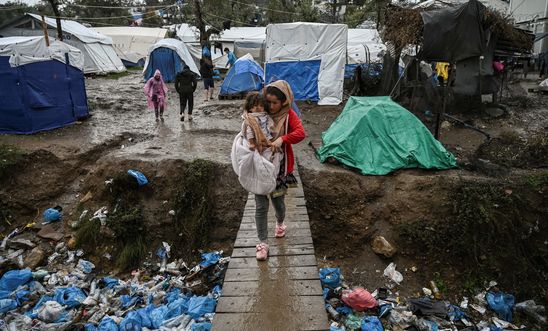
Press releases
Global: Starvation 'bigger threat' than COVID-19 in many refugee camps

Governments around the world ‘preventing deliveries of food and water, locking people up, or sending them back to war and persecution’
Amnesty calls for concerted global action to protect refugees as countries prepare to come out of lockdown
‘Any government which allows refugees to die of starvation or thirst during lockdowns has failed dismally at tackling this crisis’ - Iain Byrne
Thousands of refugees and migrants around the world are at risk of starving to death during the coronavirus pandemic, warned Amnesty International today.
Lockdowns and movement restrictions have exacerbated dire living conditions in refugee camps around the world, leaving millions of people at risk of starvation and illness.
For example, last month water supplies were deliberately cut off by the local authorities in Bosnia’s Vucjuk camp to force the relocation of the camp’s inhabitants. In Jordan’s Zaatari camp, lockdowns have prevented people from working - meaning inhabitants have no food or income to pay for even basic necessities.
Residents of makeshift camps in France’s Calais settlements have also not receiving deliveries of food and water due to lockdowns, and restrictions on movement have made it impossible for them to shop for themselves, even if they had money to do so.
Amnesty is calling for concerted global action to ensure hundreds of thousands of people on the move are provided with adequate access to food, water, sanitation and healthcare to ensure their survival as countries prepare to come out of lockdown.
The inhumane treatment of refugees and migrants threatens to stall progress on tackling COVID-19, with fears that overcrowded camps and detention centres will become new epicentres of the virus unless urgent action is taken.
Iain Byrne, Head of Amnesty International’s Refugee and Migrant Rights team, said:
“In many camps, death by starvation is now reported to be a bigger threat than the virus itself.
“At a time when we need compassion and cooperation more than ever, some governments have instead doubled down on discrimination and abuse - preventing deliveries of food and water, locking people up, or sending them back to war and persecution.
“This is an appalling abdication of the collective responsibility to protect refugees and migrants, and we are urging states to take immediate action to prevent this becoming a human rights catastrophe.
“Any government which allows refugees to die of starvation or thirst during lockdowns has failed dismally at tackling this crisis.”
Unnecessary detention
Many governments have also continued to unnecessarily detain people seeking asylum when there aren’t enough tests and protective equipment - putting them at risk of contracting the virus. For example, people held in immigration detention in Australia have been begging to be released because they are frightened that staff who have not been issued with personal protective equipment will unknowingly bring the virus in.
Forcing people back to danger
Other governments have violated international law by forcing people back to danger under the pretext of containing COVID-19.
The US authorities turned back 10,000 people within two hours of their arrival on US soil between 20 March and 8 April. Similarly, Malaysia turned back a boat of Rohingya people seeking safety; although Bangladesh eventually allowed the boat to land, at least 30 people had reportedly died when their vessel drifted at sea for two months. Presently, there are reports that several hundred people urgently need search-and-rescue assistance in the region.
Forcing people back to countries where they are reasonably expected to face persecution, torture or other cruel or degrading treatment is illegal under international law.